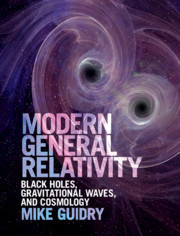Description
Modern General Relativity
Black Holes, Gravitational Waves, and Cosmology
Author: Guidry Mike
Introduces the physics of general relativity in relation to modern topics such as gamma-ray bursts, black holes, and gravitational waves.
Language: English
Approximative price 70.08 €
In Print (Delivery period: 14 days).
Add to cart
Publication date: 01-2019
622 p. · 19.3x25.2 cm · Hardback
622 p. · 19.3x25.2 cm · Hardback
Description
/li>Contents
/li>Biography
/li>
Einstein's general theory of relativity is widely considered to be one of the most elegant and successful scientific theories ever developed, and it is increasingly being taught in a simplified form at advanced undergraduate level within both physics and mathematics departments. Due to the increasing interest in gravitational physics, in both the academic and the public sphere, driven largely by widely-publicised developments such as the recent observations of gravitational waves, general relativity is also one of the most popular scientific topics pursued through self-study. Modern General Relativity introduces the reader to the general theory of relativity using an example-based approach, before describing some of its most important applications in cosmology and astrophysics, such as gamma-ray bursts, neutron stars, black holes, and gravitational waves. With hundreds of worked examples, explanatory boxes, and end-of-chapter problems, this textbook provides a solid foundation for understanding one of the towering achievements of twentieth-century physics.
Part I. General Relativity: 1. Introduction; 2. Coordinate systems and transformations; 3. Tensors and covariance; 4. Lorentz covariance and special relativity; 5. Lorentz-invariant dynamics; 6. The principle of equivalence; 7. Curved spacetime and general covariance; 8. The general theory of relativity; 9. The Schwarzschild spacetime; 10. Neutron stars and pulsars; Part II. Black Holes: 11. Spherical black holes; 12. Quantum black holes; 13. Rotating black holes; 14. Observational evidence for black holes; 15. Black holes as central engines; Part III. Cosmology: 16. The Hubble expansion; 17. Energy and matter in the Universe; 18. Friedmann cosmologies; 19. Evolution of the Universe; 20. The Big Bang; 21. Extending classical Big Bang theory; Part IV. Gravitational Wave Astronomy: 22. Gravitational waves; 23. Weak sources of gravitational waves; 24. Strong sources of gravitational waves; Part V. General Relativity and Beyond: 25. Tests of general relativity; 26. Beyond standard models.
Mike Guidry is Professor of Physics and Astronomy at the University of Tennessee, Knoxville. His current research is focused on the development of new algorithms to solve large sets of differential equations, and applications of Lie algebras to strongly-correlated electronic systems. He has written five textbooks and authored more than 120 journal publications on a broad variety of topics. He previously held the role of Lead Technology Developer for several major college textbooks in introductory physics, astronomy, biology, genetics, and microbiology. He has won multiple teaching awards and is responsible for a variety of important science outreach initiatives.
© 2024 LAVOISIER S.A.S.
These books may interest you

Tensors, Relativity, and Cosmology 122.46 €



